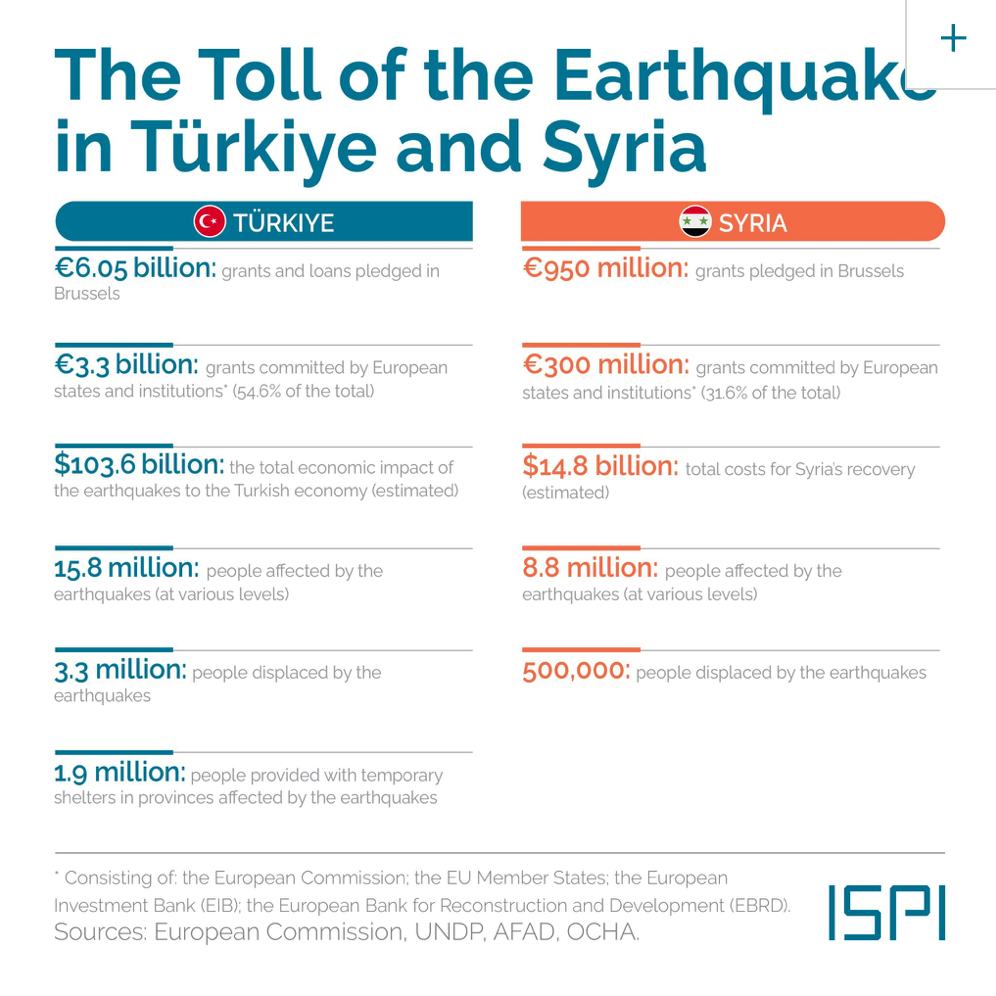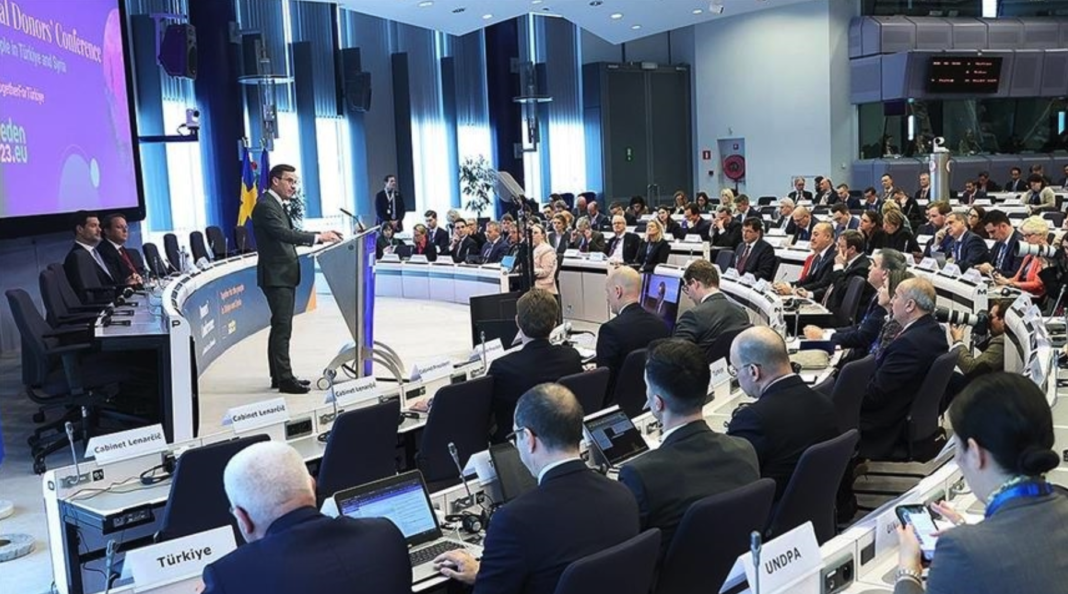7 billion euros were pledged to help earthquake victims in Turkey and Syria, but concerns remain about how to provide aid. By Francesco Salesio Schiavi in Italian Institute for International Political Studies on March 24, 2023.
On the 20th of March, a new step was taken by the global community to support the earthquake victims in Syria and Türkiye. Six weeks after the catastrophe, delegations from the EU and EU member states, the G20, the Gulf Cooperation Council, and international humanitarian and financial institutions convened in Brussels for the International Donors’ Conference. The summit succeeded in pledging 7 billion euros worth of donations and loans for the reconstruction effort (most of which came from EU states and financial institutions), with 6.05 billion euros allocated to Türkiye and 950 million to Syria. Despite this remarkable result, the path to recovery will be arduous. In Türkiye, the earthquakes destroyed or damaged hundreds of thousands of buildings, affected the lives of millions of citizens, and raised the economic costs for reconstruction and recovery to more than 100 billion dollars (9% of the national GDP). This is an enormous toll that dwarfs what has so far been promised by the entire international community. Still, international funds (and their swift allocation) will be critical to Turkish reconstruction efforts, especially as the country undergoes national elections in May with an uncertain outcome. The situation is just as complicated in Syria, where a strong reluctance to engage with Assad’s regime casts a shadow on the future of European support to the country.
Experts from the ISPI MED network respond to the results of the March 20th fundraising conference for Syria and Türkiye.

A gesture that the Turkish people won’t forget
“Seven billion euros were pledged to Türkiye and Syria at the donor’s conference held in Brussels this week, in addition to an estimated immediate assistance of $700 million made by its traditional allies in the EU, US and Japan. According to the World Bank, the direct damage cost is estimated to be around $35 billion without considering recovery and reconstruction costs. The UN estimates this cost to be approximately $100 billion. The Turkish government plans to build 650,000 new homes in the region and seeks to complete almost half within one year. This is a very ambitious goal. A rapid recovery is important to help restart local economies and return to normalcy, but building back in line with technical specifications this time to prevent another such tragedy of this magnitude is just as important. International support can help get critical supplies and relief on the ground in the short term and assure that global standards for construction are met in the vulnerable seismic regions in the longer term. This stage will also require complete transparency and inspections. Nevertheless, the pledge at the conference will provide significant relief for February the 6th earthquakes and is a gesture that the Turkish people won’t soon forget.”
Defne Arslan, Senior Director, Atlantic Council in Türkiye
A one-day summit won’t remove a decade of disagreements.
“While the EU fundraising initiative and the fact that most of the aid pledged at the international donors’ conference came from the EU and EU countries offers the EU and Ankara an opportunity to work together in the coming period, it is unlikely that it will have a significant impact on bilateral relations. The years of mistrust between the current Turkish government and the EU have been alleviated by the devastation and tragedy caused by the earthquake, but this does not eliminate the problems that remain at the root of the mistrust between the two parties. For this reason, the outcome of the May elections will determine both the evolution of these relations and the prospects for collaboration in the reconstruction process.”
Kadri Tastan, Senior Fellow, German Marshall Fund (GMF)
Helping Syria without helping Assad: A zero-sum game for Brussels?
“Rebuilding Syrian homes and infrastructure would inevitably entail some measure of state collaboration and exploitation. EU leaders want nothing to do with Assad, and they definitely don’twant to help his regime. However, some member states say leaving Syria to rot is worse: it can trigger a conflict relapse, increase migration, and so on. As time passes and the situation in Syria grows more critical, that debate will intensify. In political terms, the EU claims to be using its economic clout to force a transition. The argument is that Assad wants EU aid so badly that he’ll agree to reform, even though he’s fought a twelve-year war to avoid that. It’s silly—a cop-out, a policy to avoid losing face. You can condemn Assad and not fund reconstruction, if that’s what you want, without pretending that it adds up to a strategy to democratize Syria.”
Aron Lund, Fellow, Century International; and Researcher, Swedish Defence Research Agency (FOI)
For his diplomatic rehabilitation, Assad doesn’t look West
“The EU decided to allocate funds for emergency relief and humanitarian needs in the short run, implicitly showing its reluctance to engage with Assad’s regime in the long term. But the reluctance is reciprocal. Assad has officially welcomed European aid, but he is certainly not counting on the EU or any European/Western actors to rehabilitate him on the world stage. He is living his diplomatic momentum, exploiting the tragedy to re-engage with international diplomacy and normalize Damascus’ relations with potential donors and partners, but there is no ‘West’ in his vision. His latest visits to Oman and the UAE, as well as the recent announcement of re-establishing ties with Saudi Arabia, prove that normalization with Arab countries remains his number one priority. Whereas his visit to Moscow on the 15th of March is the umpteenth demonstration of who ‘deserves’ Assad’s most sincere gratitude: Russia. On the 12th anniversary of the Syrian uprising, he was in Moscow paying tribute to Putin for Russia’s support in the aftermath of the quake and offering Syria’s support to Russia regarding the war in Ukraine. The emergency management is boosting Syria’s reintegration at the regional level: a positive outcome for both Damascus and the Russians.”
Chiara Lovotti, Rome MED Dialogues Scientific Coordinator and Research Fellow, ISPI

